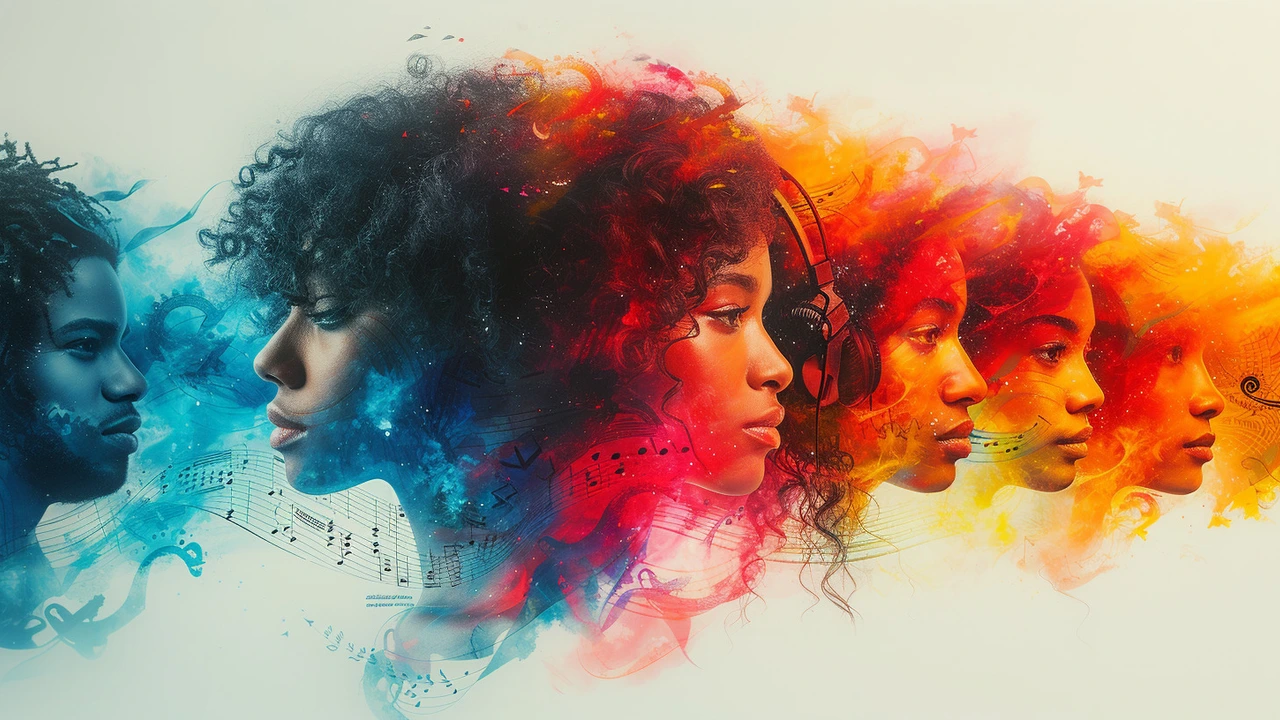The Foundations of Blues: Chronicling the Soul’s Resonance
In the heart of the American South, amid the struggles and adversities of the early 20th century, the blues genre found its voice. It was a music form deeply rooted in African American history, echoing the emotional depth and raw experiences of life. Artists like B.B. King, Muddy Waters, and Robert Johnson became synonymous with the blues, each adding their unique flavors to this soulful genre. B.B. King’s expressive guitar playing, known as his 'vibrato', alongside his heartfelt singing, carved out a new path for blues music. Meanwhile, Muddy Waters electrified the genre, quite literally, by introducing the electric guitar to blues, setting the stage for rock ‘n’ roll. Robert Johnson, with his haunting vocals and masterful guitar skills, left behind a legacy that would influence countless musicians across genres.
Jazz: The Symphonic Melody of Freedom
Jazz emerged as a confluence of African and European musical traditions, blossoming in the vibrant atmosphere of New Orleans in the late 19th and early 20th centuries. Legends like Louis Armstrong, Duke Ellington, and Ella Fitzgerald mastered the art of improvisation, turning jazz into an exploration of creativity and expression. Armstrong’s trumpet and distinctive vocal style lifted jazz onto the global stage, making him one of the first international jazz stars. Duke Ellington, with his innovative approach to composition and orchestration, transformed jazz into a sophisticated art form. Ella Fitzgerald, known for her purity of tone and impeccable diction, became the queen of jazz, enchanting audiences worldwide. Their contributions not only expanded the boundaries of jazz but also paved the way for future genres.
Rock ‘n’ Roll: The Beat that Shook the World
The mid-20th century witnessed the birth of rock ‘n’ roll, a genre that would redefine music and culture. Artists like Elvis Presley, Chuck Berry, and Little Richard brought a new energy and rebellious spirit to the scene. Elvis Presley, with his charismatic presence and fusion of country music with rhythm and blues, became the icon of rock ‘n’ roll. Chuck Berry’s guitar riffs and storytelling lyrics in songs like “Johnny B. Goode” laid the foundation for rock music. Little Richard’s dynamic performances and flamboyant style broke down social barriers, making him one of the pioneers of the genre. Together, they created a sound that was irresistible, marking the dawn of a new era in music.
Reggae: Rhythms of Resistance and Celebration
Originating from the heart of Jamaica in the 1960s, reggae music was more than just a genre; it was a voice for social commentary and a call for unity. Bob Marley, Peter Tosh, and Bunny Wailer of The Wailers transformed reggae into a global phenomenon, infusing it with messages of peace, love, and resistance. Bob Marley, in particular, became a symbol of reggae’s soulful ethos, spreading its reach beyond Jamaica’s shores. His songs, like “No Woman, No Cry” and “Redemption Song,” resonate with audiences worldwide, serving as timeless reminders of reggae’s power and message.
Punk Rock: The Anthem of Subversion and Autonomy
Punk rock emerged in the 1970s as a reaction against the established norms of music and society, championing DIY ethics and individual freedom. Bands like The Ramones, The Sex Pistols, and The Clash challenged the status quo with their aggressive sound and rebellious lyrics. The Ramones’ speedy, stripped-down songs set the blueprint for punk music, while The Sex Pistols’ anarchic energy captured the disillusionment of youth. The Clash’s socially conscious lyrics and eclectic musical style broadened punk’s appeal, proving it to be a diverse and evolving genre. Punk rock’s legacy is evident in its enduring influence on music and culture.
Hip-Hop: Rhymes of Reality
In the late 1970s, hip-hop emerged from the boroughs of New York City as a vibrant form of cultural expression. Through the pioneering work of artists like Grandmaster Flash, Afrika Bambaataa, and The Sugarhill Gang, hip-hop became a powerful medium for storytelling and social commentary. Grandmaster Flash’s innovative turntablism and The Furious Five’s socially conscious lyrics in “The Message” highlighted the struggles and aspirations of urban life. Afrika Bambaataa’s fusion of electronic music with African beats helped define hip-hop’s sound. The Sugarhill Gang’s “Rapper's Delight” brought hip-hop to mainstream audiences, cementing its place in music history.
Electronic Dance Music: The Pulse of the Digital Age
Electronic dance music (EDM) traces its roots to the discothèques of the 1980s, evolving into a global movement that has captured the hearts of millions. Pioneers like Daft Punk, The Chemical Brothers, and Avicii each contributed to the genre’s explosively popular and diverse sounds. Daft Punk’s combination of house music with synth-pop created a distinctive sound that propelled them to international fame. The Chemical Brothers’ big beat tracks were instrumental in bringing electronic music to the forefront of the mainstream. Avicii’s melodic approach to EDM and his worldwide hits, such as “Wake Me Up,” showcased the genre’s potential to bridge electronic music with pop and other genres.
Conclusion: The Legacy of Musical Pioneers
The evolution of music genres is a testament to the creativity, resilience, and vision of the artists who dared to innovate and express themselves in new ways. From the soul-stirring sounds of blues to the electric energy of EDM, each genre carries the signature of its pioneers—artists who not only created music but also shaped cultural movements. As we look back on the contributions of these musical innovators, it’s clear that their legacies extend far beyond their melodies and lyrics. They have left an indelible mark on the fabric of music history, inspiring generations of musicians and listeners alike to explore, create, and dream.

